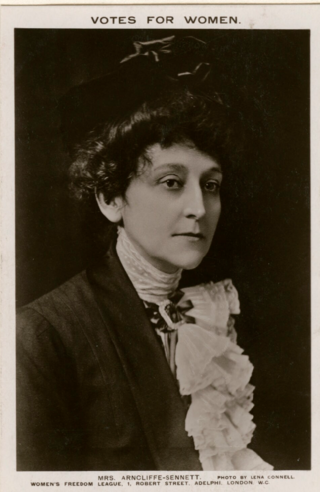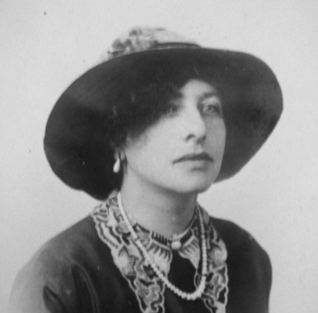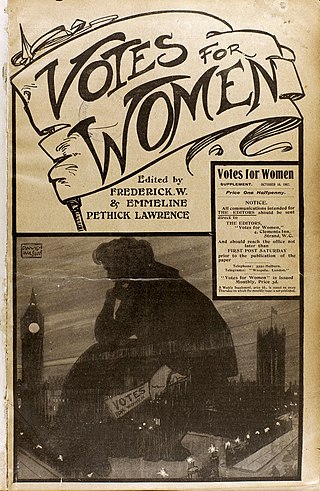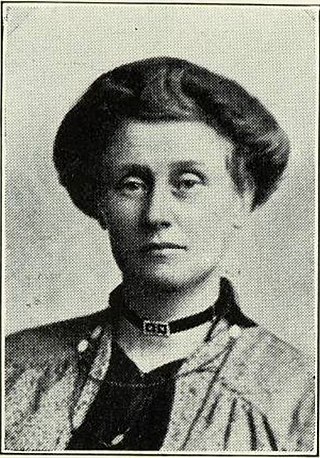
The Women's Social and Political Union (WSPU) was a women-only political movement and leading militant organisation campaigning for women's suffrage in the United Kingdom from 1903 to 1918. Known from 1906 as the suffragettes, its membership and policies were tightly controlled by Emmeline Pankhurst and her daughters Christabel and Sylvia; Sylvia was eventually expelled.

The Congressional Union for Woman Suffrage was an American organization formed in 1913 led by Alice Paul and Lucy Burns to campaign for a constitutional amendment guaranteeing women's suffrage. It was inspired by the United Kingdom's suffragette movement, which Paul and Burns had taken part in. Their continuous campaigning drew attention from congressmen, and in 1914 they were successful in forcing the amendment onto the floor for the first time in decades.

The United Procession of Women, or Mud March as it became known, was a peaceful demonstration in London on 9 February 1907 organised by the National Union of Women's Suffrage Societies (NUWSS) in which more than 3,000 women marched from Hyde Park Corner to the Strand in support of women's suffrage. Women from all classes participated in what was the largest public demonstration supporting women's suffrage seen until then. It acquired the name "Mud March" from the day's weather since incessant heavy rain left the marchers drenched and mud-spattered.

The Women Writers' Suffrage League (WWSL) was an organisation in the United Kingdom formed in 1908 by Cicely Hamilton and Bessie Hatton. The organisation stated that it wanted "to obtain the Parliamentary Franchise for women on the same terms as it is, or may be, granted to men. Its methods are the methods proper to writers – the use of the pen." The organisation viewed itself as a writers' group rather than a literary society. Membership was not based on literary merit, but instead was granted to anyone who had published and sold a written work. Members also paid an annual subscription fee of 2s. 6d. The league was inclusive and welcomed writers of all genders, classes, genres, and political persuasions provided they were pro-suffrage. By 1911 the league was composed of conservatives, liberals and socialists, women of power and women who worked hard and members of the military. The league disbanded on 24 January 1919 following the passing Representation of the People Bill in February 1918, granting women over the age of 30 the right to vote.

A movement to fight for women's right to vote in the United Kingdom finally succeeded through acts of Parliament in 1918 and 1928. It became a national movement in the Victorian era. Women were not explicitly banned from voting in Great Britain until the Reform Act 1832 and the Municipal Corporations Act 1835. In 1872 the fight for women's suffrage became a national movement with the formation of the National Society for Women's Suffrage and later the more influential National Union of Women's Suffrage Societies (NUWSS). As well as in England, women's suffrage movements in Wales, Scotland and other parts of the United Kingdom gained momentum. The movements shifted sentiments in favour of woman suffrage by 1906. It was at this point that the militant campaign began with the formation of the Women's Social and Political Union (WSPU).

A suffragette was a member of an activist women's organisation in the early 20th century who, under the banner "Votes for Women", fought for the right to vote in public elections in the United Kingdom. The term refers in particular to members of the British Women's Social and Political Union (WSPU), a women-only movement founded in 1903 by Emmeline Pankhurst, which engaged in direct action and civil disobedience. In 1906, a reporter writing in the Daily Mail coined the term suffragette for the WSPU, derived from suffragist, in order to belittle the women advocating women's suffrage. The militants embraced the new name, even adopting it for use as the title of the newspaper published by the WSPU.
Frederick Charlwood Frye was a British grocer and Liberal Party politician.

The Church League for Women's Suffrage (CLWS) was an organisation campaigning for women's suffrage in the United Kingdom. The league was started in London, but by 1913 it had branches across England, in Wales and Scotland and Ireland.
The United Suffragists was a women's suffrage movement in the United Kingdom.

Women's suffrage in Wales has historically been marginalised due to the prominence of societies and political groups in England which led the reform for women throughout the United Kingdom. Due to differing social structures and a heavily industrialised working-class society, the growth of a national movement in Wales grew but then stuttered in the late nineteenth century in comparison with that of England. Nevertheless, distinct Welsh groups and individuals rose to prominence and were vocal in the rise of suffrage in Wales and the rest of Great Britain.

Alice Maud Arncliffe Sennett also known with the stage name of Mary Kingsley was an English actress and suffragist and a suffragette, arrested four times for her activism.

Katharine "Kate" Parry Frye was a British actress, a lifelong diarist and suffragist.

Votes for Women was a newspaper associated with the women's suffrage movement in the United Kingdom. Until 1912, it was the official newspaper of the Women's Social and Political Union, the leading suffragette organisation. Subsequently, it continued with a smaller circulation, at first independently, and then as the publication of the United Suffragists.

The Glasgow and West of Scotland Association for Women’s Suffrage was an organisation involved in campaigning for women’s suffrage, based in Glasgow, with members from all over the west of Scotland.

Gladys Pott was an English anti-suffragist and civil servant.
Jessie Cunningham Methven was a Scottish campaigner for women's suffrage. She was honorary secretary of the Edinburgh National Society for Women's Suffrage from the mid 1890s until 1906. She subsequently joined the more militant Women's Social and Political Union and described herself as an "independent socialist".

The Hunger Strike Medal was a silver medal awarded between August 1909 and 1914 to suffragette prisoners by the leadership of the Women's Social and Political Union (WSPU). During their imprisonment, they went on hunger strike while serving their sentences in the prisons of the United Kingdom for acts of militancy in their campaign for women's suffrage. Many women were force-fed and their individual medals were created to reflect this.
Agnes Helen Harben was a British suffragist leader who also supported the militant suffragette hunger strikers, and was a founder of the United Suffragists.
Adeline Mary Chapman, first married name Adeline Guest, was an English campaigner for women's suffrage. She was a suffragist, and opposed the militancy of the suffragettes. Having been an early member of the Women's Social and Political Union, she was a member of the Central Society for Women's Suffrage from 1901. Unhappy with what she perceived as the ineffectiveness of the National Union of Women's Suffrage Societies (NUWSS), the main suffragist organisation, she was the founding president of the New Constitutional Society for Women's Suffrage (NCS).















